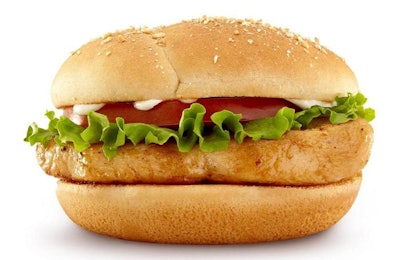
Farm Animal Investment Risk & Return (FAIRR), a coalition of 54 institutional investors, is targeting ten of the largest restaurant groups in the United States and United Kingdom, urging them to adopt stricter policies concerning the use of antibiotics in their global meat and poultry supply chains.
Companies contacted include McDonald’s, Domino’s Pizza Group, Yum! Brands, The Wendy’s Company, Darden Restaurants, JD Wetherspoon, Brinker International, Restaurant Brands International, Restaurant Group, and Mitchells & Butlers.
According to a press release from FAIRR, the campaign is being launched in response to warnings from the World Health Organization (WHO) that states irresponsible antibiotics practices are leading to problems of antibiotic resistance.
The coalition is asking the companies to set appropriate timelines to prohibit the use of all medically important antibiotics in their global supply chains. Investors within the group claim that investments could be jeopardized by companies that do not have a firm stance on animal antibiotic use.
“This $1.5 trillion investor coalition sends a powerful message to corporations that this issue is firmly on the investor radar, and that the current state of play must change,” stated Nadira Narine, program director, Strategic Initiatives at ICCR, a participating investor group. “Consumer concern about antibiotic resistance and demand for meat produced without routine antibiotics has increased significantly. We hope this engagement will help drive up standards in the sector and highlight the financial risks at stake to other companies and investors.” Companies can improve their market position by adopting policies to reflect these consumer preferences.”
Targeted companies’ moves to limit antibiotic use
Prior to the FAIRR campaign, several of the targeted restaurant groups had already implemented initiatives to reduce the use of animal antibiotics within its supply chain. McDonald’s in 2015 announced that it would phase out serving meat from chickens treated with antibiotics also used in human medicine at its restaurants in the U.S. and Canada.
Wendy’s, also in 2015, tested the sale of antibiotic-free chicken at restaurants at regional markets in Florida, Texas and Missouri.
Darden Restaurants, in a statement on its website, said it supports the U.S. Food and Drug Administration (FDA) guidelines that recommend that by the end of 2016, antibiotics that are medically important in human medicine be phased out from use with farm animals for growth purposes, and shared-class antibiotics only be used for the treatment of disease in farm animals under the supervision of a veterinarian. Darden is the parent company of Olive Garden, LongHorn Steakhouse, Bahama Breeze, Seasons 52, The Capital Grille, Eddie V's and Yard House.















